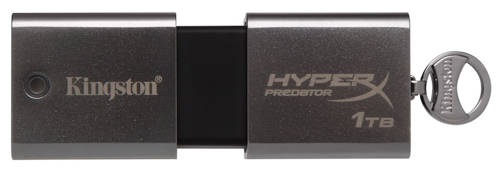This article is more than 1 year old
Faster-than-disk 1TB USB on sale soon... but if you lose it, you've lost £2k+
Plus: SanDisk and Tosh add crypto flash dash to SSD ranges
CES 2013 CES is the time to introduce new gadget gizmos and Kingston, SanDisk and Toshiba have stepped up to the flash front to parade their latest gear.
SanDisk has updated two of its SSDs with Toshiba 19nm NAND and increased performance. Kingston has introduced a terabyte USB memory stick - damned expensive if you lose it - and Toshiba has added a pair of cryptographic erase flash drives. If you lose the drives or they get stolen your data is safe. Tosh has also announced a mobile SATA disk drive which might get overlooked in the flurry of flash at CES.
The Ultra Plus with its 64GB, 128GB and 256GB capacity points can be contrasted with the mid-2011 vintage SAnDisk Ultra and its 60GB, 120GB and 240GB capacities built from, we recall, 24nm NAND. We understand both drives use 2-bit MLC flash and the new one reads and writes sequential data at 530MB/sec and 445MB/se respectively through a 6Gbit/s SATA interface. The older model performed at a more leisurely 260MB/sec and 270MB/sec through a 3Gbit/s SATA port. Ultra Plus is for the retail channel and targeted at notebook and desktop PC users wanting to boost a disk-bound system's speed for booting, shutdown and application loading.
SanDisk's second CES SSD is for the OEM channel and is the X110, which updates the existing X100. Once again 2-bit 24nm NAND gives way to 2-bit 19nm MLC NAND. Its IOPS numbers are boosted a lot but the sequential read/write numbers are quite similar. The X110 does up to 81,000 random read IOPS and 44,000 random write ones, whereas the prior X100 did 38,000 and 22,000 respectively.
The older model's sequential numbers were 500MB/sec and 420MB/sec for reads and writes, with the X110 doing 505MB/se and 445MB/sec - not much improvement at all. The X110's endurance is said to be 80TB W and it has a 2 million hour MTBF (Mean Time Between Failure) rating; both the same as the X100. Basically the X110 is an X100 that reacts more quickly.
SanDisk also announced a design win: its mSATA mini form factor U100 SSD is being used by ASUS in the ASUS Transformer Book, a notebook with a detachable tablet.
The Ultra Plus drive is available now at Amazon.com and Microcenter.com in 64GB, 128GB and 256GB2 capacities carrying suggested retail prices of $74.99, $109.99 and $219.99, respectively. No pricing has been provided for the X110.
Toshiba
Tosh has added encryption and cryptographic erase to three existing SDD models and has announced a new mobile computer disk drive. It's a potentially confusing model line-up, so pay attention at the back:
- The PX02AM entry-level and mid-range server and storage array 6 Gbits SATA SSD is joined by the PX02AMU cryptographic erase version. An automatic cryptographic-erase occurs if an unexpected host attempts to access the HDDs or if a defined number of authentication failures occurs. In other words the key access information is deleted rendering the data contents inaccessible junk.
- The PX02AN entry-level server SATA SSD is joined by the PX03ANU with cryptographic erase. This is targeted at entry-level server applications and uses 19nm cMLC (consumer multi-level cell) NAND flash.
- The PX02SM enterprise SAS interface SSD gets two new buddies; the PX2SMQ and U, both with cryptographic-erase and TCG Enterprise Security Sub-Class to provide dual level security. The U model holds 1.6TB while the Q model stores 200, 400 or 800GB.
Toshiba's SATA mobile disk drive is given a typically non-glamorous moniker by Toshiba, the MQ01ABUxxxW series. It provides self-encryption, cryptographic-erase and TCG-Opal protocol support in a 7mm z-height form factor and runs up from 250GB through 320GB to 500GB capacity using one platter spinning at 5,400rpm with a SATA 3.0 - 6Gbit/s - interface. It supports Toshiba’s Wipe technology, with an automatic cryptographic-erase if, as above, an unexpected host attempts to access the HDDs or if a defined number of authentication failures occurs.
Kingston
Fancy a humongous USB stick capacity? Kingston will sell you a 512GB DataTraveler HyperX Predator 3.0 USB thumb drive for, wait for it, £1,750 ($2,815). A 1TB capacity one is coming later this quarter but its price is still being calculated. We can confidently tell you it will be more than £1,751 ($2,816), maybe as much as £3,000 ($5,000).

Kingston DataTraveler HyperX Predator 3.0 1TB
What do you get for your money?
- Data transfer speeds of up to 240MB/sec read and 160MB/sec write
- USB 3.0 interface
- A zinc alloy case and HyperX valet keychain.
It doesn't even come with a platinum or gold case.
What don't you get? Cryptographic data protection for one. You pay £1,750 quid and you don't even get encrypted data?
Andrew Ewing, Kingston's Flash memory business manager, said: "The large capacity and fast USB 3.0 transfer speeds allow users to save time as they can access, edit and transfer applications or files such as HD movies directly from the drive without any performance lag." It's faster than disk in other words.
The unwritten thing you do get for your money is the ability to lose more data stored in a smaller space for more money than ever before, more easily than before. A 1TB pocket hard disk drive is going to be a lot cheaper and a lot harder to lose. Hitachi GST's 1TB G-Drive is yours for $199.99, one-fourteenth of the price of the 512GB Data Traveler HyperX Predator 3.0 thumb drive. You tell me the logic of buying the expensive little bleeder, faster than disk or not. ®
